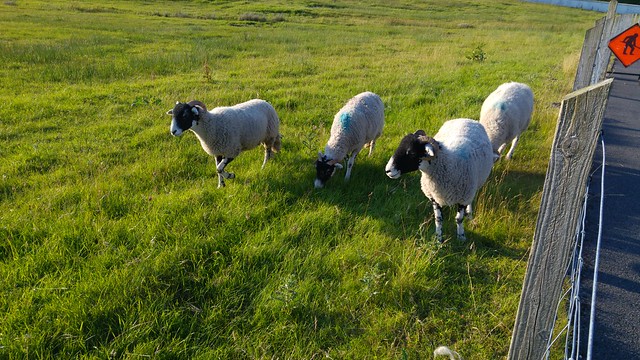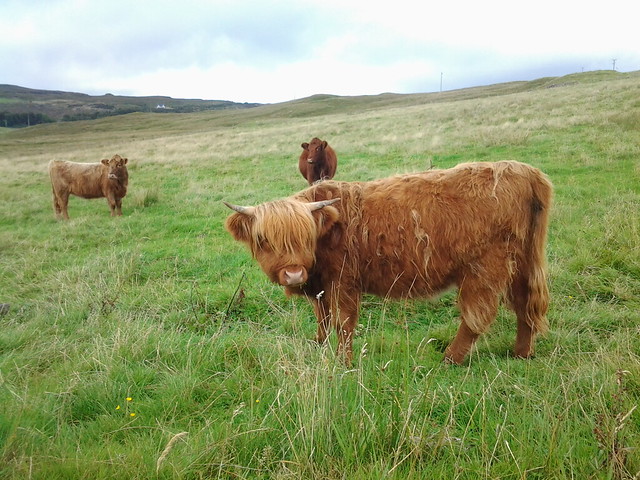Words for horse, stallion, mare, foal and related things in Celtic languages.

Note: the commonly-used words for horse in each Celtic language are: capall in Irish, each in Scottish Gaelic, cabbyl in Manx, ceffyl in Welsh, margh in Cornish, and marc’h in Breton.
Words marked with a * are reconstructions.
| Proto-Celtic |
*kaballos, *kapallos, *kappilos = horse |
| Gaulish |
*caballos = horse |
| Old Irish (Goídelc) |
capall [ˈkapal͈] = horse |
| Middle Irish (Gaoidhealg) |
capall, capail = horse |
| Irish (Gaeilge) |
capall ˈkapˠəl̪ˠ] = horse, mare
capallach = equine
capaillín = pony
capall maide = wooden, vaulting horse, hobby-horse |
| Scottish Gaelic (Gàidhlig) |
capall [kahbəl̪ˠ] = mare, colt, horse, small horse
capall-aibhne = hippopotamus
capall-coille = capercaillie
capall-mara = seahorse
capallach [kahbəl̪ˠəx] = pertaining to or abounding in mares/colts
capallan [kahbəl̪ˠan] = small horse, pony |
| Manx (Gaelg) |
cabbyl = horse, mount
cabbyl awin = hippopotamus
cabbyl assylagh = mule |
| Proto-Brythonic |
*kėfɨl = horse |
| Middle Welsh (Kymraec) |
keffyl, ceffyl = horse
keffylyn = little horse, nag, pony
cavall, cauall = horse, steed |
| Welsh (Cymraeg) |
ceffyl [ˈkɛfɨ̞l / ˈkɛfɪl] = horse, nag, hobby
ceffyl yr afon = hippopotamus
ceffylaf, ceffylu = to put on horseback, put one to ride the high horse, extol
ceffylaidd = pertaining to horses, equine, horsy
ceffylan = little horse, nag
ceffyles = mare
ceffylyn = little horse, nag, pony
cafall = horse, steed |
| Middle Cornish (Cernewec) |
cevil, kevil = horse |
| Old Breton (Brethonoc) |
cefel = horse |
Etymology: uncertain – related to the Late Latin caballus (horse, nag) and Ancient Greek καβάλλης (kabállēs – nag) and maybe Persian کول (kaval – second class horse of mixed blood). Possibly ultimately from PIE *kebʰ- (worn-out horse, nag). Words from the same roots include cheval (horse) in French, cavalier in English and caballo (horse) in Spanish [source].
The Breton word kefeleg (woodcock) comes from the same Proto-Brythonic root, as does kevelek (woodcock) in Cornish and cyffylog (woodcock) in Welsh [source].
| Proto-Celtic |
*markos = horse |
| Galatian |
*μάρκαν (márkan) = horse |
| Gaulish |
*markos = horse |
| Old Irish (Goídelc) |
marc [mark] = horse |
| Middle Irish (Gaoidhealg) |
marc = horse |
| Irish (Gaeilge) |
marc [mˠaɾˠk] = horse (literary / archaic)
marcach = horseman, rider, jockey; cavalryman, Cavalier
marcachas = horsemanship
marchaigh = to ride
marcaíocht = riding, horsemanship, ride drive lift |
| Scottish Gaelic (Gàidhlig) |
marc [marxk] = charger (warhorse – literary)
marc-shluagh = horsemen, riders, cavalry
marchach = equestrian, mounted; riding |
| Manx (Gaelg) |
mark = horse
mark-sleih = horseman
markiagh = to ride, riding, cavalier, equestrian, horseman, jockey, rider
markiaghey = riding
markiaght = drive, equitation, horsemanship, (horse) riding, lift, rider |
| Proto-Brythonic |
*marx = horse |
| Middle Welsh (Kymraec) |
march = horse |
| Welsh (Cymraeg) |
march [marχ] = horse, stallion, war-horse, steed
marchaidd = pertaining to a horse, horsy, horselike, equine
marchallu = horsepower
marchasyn = jackass, male donkey
marchdy = stable
marchfeddyg = horse doctor, farrier
marchfilwr = dragoon, cavalryman, cavalier, trooper
marchog = horseman, rider, jockey, mounted warrior, knight |
| Old Cornish |
march = horse |
| Middle Cornish (Cernewec) |
march = horse |
| Cornish (Kernewek) |
margh [ˈmaɾx] = horse
marghek = knight, rider
margh-leska = rocking horse
marghnerth = horsepower
marghogeth = to ride (a horse)
marghti = stable |
| Old Breton (Brethonoc) |
marh = horse |
| Middle Breton (Brezonec) |
march = horse
marcheg, marhec = horseman, rider, knight
marecat = to ride (a horse)
marheguez = to ride (a horse), to dominate |
| Breton (Brezhoneg) |
marc’h [marx] = horse, easel
marc’h-tan [marxˈtãː.n] = motorbike
marc’heg [ˈmar.ɣɛk] = horseman, rider, knight
marc’hegkaat [mar.ɣe.ˈkɑːt] = to ride (a horse)
marc’hegañ =
marc’hegezh [marˈɣeːɡɛs] = to ride (a horse), to dominate
marc’hegiezh = chivalry, cavalry |
Etymology: thought to be from the Proto-Indo-European *márkos, which is also the root of the English words mare and marshal, the French word maréchal (marshal), and related words in other languages [source].
| Proto-Celtic |
*ekʷos [ˈe.kʷos] = horse |
| Celtiberian |
ekua- = horse |
| Gaulish |
epos = horse |
| Primitive Irish |
*ᚓᚊᚐᚄ (*eqas) [exʷah] = horse |
| Old Irish (Goídelc) |
ech [ex] = horse |
| Middle Irish (Gaoidhealg) |
ech = horse
airech = packhorse |
| Irish (Gaeilge) |
each [ax] = horse, steed (archaic)
eachach = abounding in horses
eachaí = horseman, jockey, equine
eachaire = horse-attendant, groom
each-chumhacht = horse-power
eachmharcach = horseman |
| Scottish Gaelic (Gàidhlig) |
each [ɛx] = horse
each-aibhne = hippopotamus
each-coimhlinge = racehorse
eachach [ɛxəx] = pertaining to or abounding in horses, horsy
eachaire [ɛxɪrʲə] = equerry
eachan [ɛxan] = small horse, yarnwindle
eachlach [ɛxl̪ˠəx] = horse groom, jockey |
| Manx (Gaelg) |
agh [ax] = steed, riding horse
aghee = equine
aghlagh, aghragh = equestrian
eagh = horse, racehorse, riding horse, steed
eagh marrey = sea horse
eagh-veg = hobbyhorse |
| Early Brittonic |
*epālos = foal |
| Proto-Brythonic |
*eb [ɛːb] = horse
*ebọl [ɛˈbɔːl] = foal |
| Old Welsh |
eb = horse |
| Middle Welsh (Kymraec) |
ep, ebawl = colt, foal
ebawluarch, ebolfarch, ebawlfarch = colt, young horse
ebolyauc, eboliauc = in foal, capable of bearing a foal |
| Welsh (Cymraeg) |
ebol [ˈɛbɔl / ˈeːbɔl] = colt, foal, sucker
eboles [ɛˈbɔlɛs] = filly, foal
ebolaidd = coltish, frisky, playful, wanton
ebolfarch = colt, young horse
cyfeb = mare in foal
ebolig = coltish
eboliog = in foal, capable of bearing a foal |
| Middle Cornish (Cernewec) |
ebel = foal, colt |
| Cornish (Kernewek) |
ebel = horse |
| Old Breton (Brethonoc) |
ebol = horse |
| Middle Breton (Brezonec) |
ebeul = foal, filly |
| Breton (Brezhoneg) |
ebeul [ˈe.bøl] = foal
ebeulan, ebeuliañ = to foal
ebeulez = filly
keneb = mare in foal |
Etymology: from the Proto-Indo-European *h₁éḱwos, which is also the root of the Latin word for horse, equus, and the English word equine, and related words in English and other languages [source]. The horse goddess, Epona, may be related as well.
| Proto-Celtic |
*uɸorēdos = horse |
| Gaulish |
*werēdos = horse |
| Proto-Brythonic |
*gworuɨð = horse |
| Middle Welsh (Kymraec) |
goruytaur, goruit, gorwyd , gorŵydd = steed, horse
gorwyddfarch = (war-)horse, steed |
| Welsh (Cymraeg) |
gorwydd = steed, horse
gorwyddfarch = (war-)horse, steed |
Etymology: from the Proto-Celtic *uɸo- (under) and *rēdo- (to ride; riding, chariot), from Proto-Indo-European *(H)reydʰ- (to ride). Words from the same Celtic roots include palfrey (a small horse with a smooth, ambling gait), Pferd (horse) in German, and vereda (path, lane) in Spanish [source].
| Proto-Celtic |
*(φ?)lārek- = mare |
| Old Irish (Goídelc) |
láir = mare |
| Middle Irish (Gaoidhealg) |
láir, lair = mare |
| Irish (Gaeilge) |
láír [l̪ˠɑːɾʲ] = mare
An Láír Bhán = the Milky Way
láír bhán = hobby-horse
láíreog = little mare, young mare, filly, well-built girl, woman |
| Scottish Gaelic (Gàidhlig) |
làir [l̪ˠaːrʲ] = mare |
| Manx (Gaelg) |
laair = mare
laaireen = small mare |
Etymology: possibly from PIE *pōlH- (animal young), which is also the root of pony and foal in English, pollo (chicken) in Spanish, and poule (hen) in French [source].
| Proto-Celtic |
*kanxstikā = mare |
| Middle Welsh (Kymraec) |
cassec, kassec = mare |
| Welsh (Cymraeg) |
caseg [ˈkasɛg] = mare |
| Old Cornish |
casec, cassec, casac = mare |
| Middle Cornish (Cernewec) |
casek = mare |
| Cornish (Kernewek) |
kasek = mare |
| Middle Breton (Brezonec) |
casec, casecq = mare |
| Breton (Brezhoneg) |
kazeg [ˈkɑː.zek] = mare |
Etymology: from Proto-Indo-European *ḱonḱ- (horse) [source]. Words from the same root possibly include henchman in English, hengst (stallion) in Dutch, and häst (horse, knight) in Swedish [source].
| Proto-Celtic |
*stirrākos = small animal, chick |
| Old Irish (Goídelc) |
serrach = colt, faol |
| Middle Irish (Gaoidhealg) |
serrach = colt, faol |
| Irish (Gaeilge) |
searrach = colt, faol
searrachúil = foal-like, lively, flighty |
| Scottish Gaelic (Gàidhlig) |
searrach [ʃɛr̪ˠəx] = colt, faol, filly
searrachan [ʃɛr̪ˠəxan] = little foal
searrach-ruadh = buzzard |
| Manx (Gaelg) |
sharragh = faol
sharraghoil = faol-like |
Etymology: from PIE *stirp- (progeny). Words from the same root possibly include estirpe (lingeage) in Spanish, and sterpo (dry twig or branch, brushwood) in Italian [source].

Sources: Wiktionary, Am Faclair Beag, Online Manx Dictionary, Teanglann.ie, eDIL – Electronic Dictionary of the Irish Language, In Dúil Bélrai English – Old Irish glossary, Geiriadur Prifysgol Cymru, Gerlyver Kernewek, Dictionaire Favereau, TermOfis, English – ProtoCeltic WordList (PDF), Etymological Dictionary Of Proto Celtic








